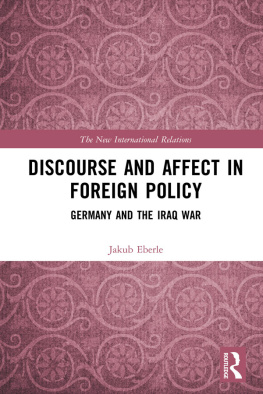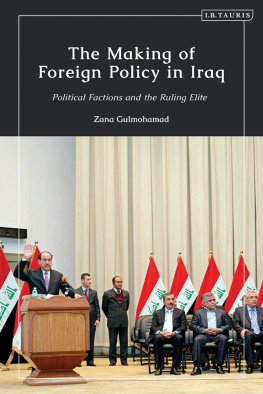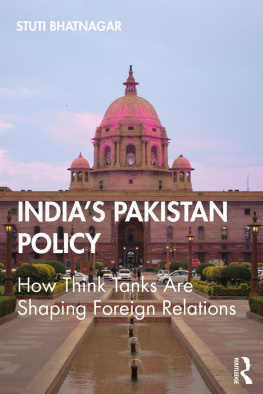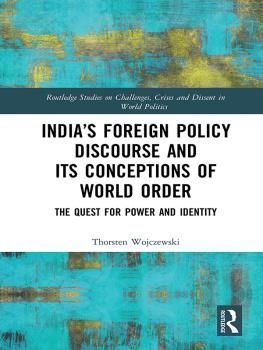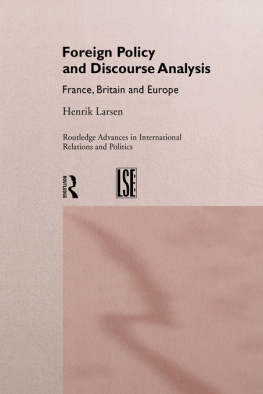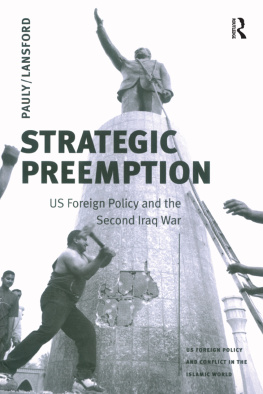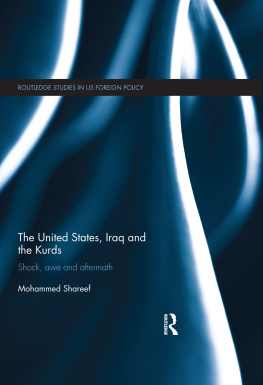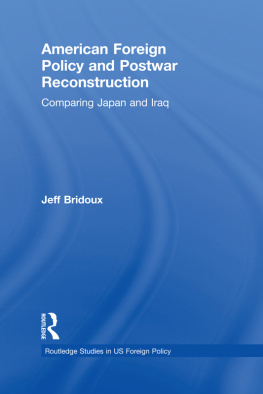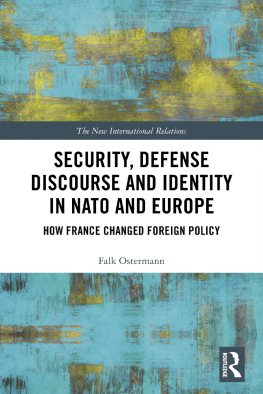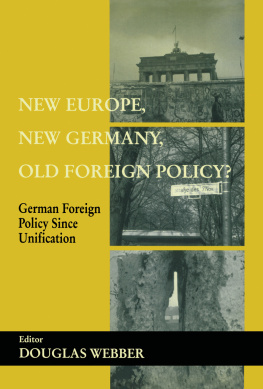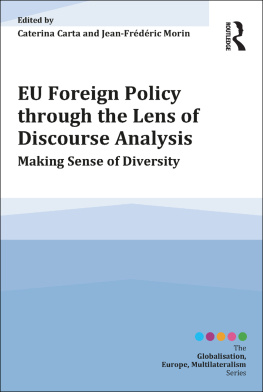The book explores the nexus between discourse, subjectivity and foreign policy. It employs a discourse theoretical perspective and combines it with insights from Lacanian psychoanalysis. It is well-written, superbly embedded in the most important literature, and theoretically path-breaking. By drawing on Germanys foreign policy discourse during the Iraq war of 2002 and 2003, the book elucidates how subjectivities can become self-contradictory when the discursive terrain is characterized by inconsistency and disorder. No other book in the field of IR is more straightforward in its combination of IR theory, discourse theory and Lacanian psychoanalysis. It is a must-read for both students and established IR scholars!
Dirk Nabers, University of Kiel, Germany
This book proposes a compelling and thought-provoking way of using Lacan for policy analysis. Lacans concepts have been prominent in discourse analysis and poststructuralist theory, yet this is the first work using Lacan in foreign policy analysis. The book provides a theoretical and analytical framework to capture affects and shows how fantasies are substantive parts of discourses creating and legitimising concrete policy steps. Addressing affective dimensions of politics, as Eberle suggests, helps us to understand how the allegedly inconsistent or contradictory policies are made and for what purpose they are made.
Anna Durnov, Institute for Advanced Studies, Vienna, Austria
Discourse and Affect in Foreign Policy not only overturns extant understandings of Germanys apparently contradictory stance during the Iraq crisis of 20023; Eberles masterful re-reading of foreign policy through social, political, and fantasmatic logics makes a distinctive and profound contribution to International Relations theory.
Nick Vaughan-Williams, University of Warwick, UK
Discourse and Affect in Foreign Policy
Foreign and security policy have long been removed from the political pressures that influence other areas of policymaking. This has led to a tendency to separate the analytical levels of the individual and the collective.
Using Lacanian theory, which views the subject as ontologically incomplete and desiring a perfect identity which is realised in fantasies, or narrative scenarios, this book shows that the making of foreign policy is a much more complex process. Emotions and affect play an important role, even where hard security issues, such as the use of military force, are concerned. Eberle constructs a new theoretical framework for analysing foreign policy by capturing the interweaving of both discursive and affective aspects in policymaking. He uses this framework to explain Germanys often contradictory foreign policy towards the Iraq crisis of 2002/2003, and the emotional, even existential, public debate that accompanied it.
This book adds to ongoing theoretical debates in International Political Sociology and Critical Security Studies and will be required reading for all scholars working in these areas.
Jakub Eberle is a senior researcher at the Institute of International Relations Prague, Czech Republic. His research interests include international relations theory, international political sociology, critical approaches to hybrid warfare, and Czech and German foreign policy. His work has appeared in International Political Sociology, Foreign Policy Analysis and Journal of International Relations and Development. He was awarded the Michael Nicholson Thesis Prize (2017) for the best dissertation in international studies defended at a British university.
The New International Relations
Edited by Richard Little
University of Bristol
Iver B. Neumann
Norwegian Institute of International Affairs (NUPI), Norway
Jutta Weldes
University of Bristol
The field of international relations has changed dramatically in recent years. This new series will cover the major issues that have emerged and reflect the latest academic thinking in this particular dynamic area.
Coercive Sanctions and International Conflicts
A Sociological Theory
Mark Daniel Jaeger
Security, Defense Discourse and Identity in NATO and Europe
How France Changed Foreign Policy
Falk Ostermann
Special Relationships in World Politics
Inter-state Friendship and Diplomacy after the Second World War
Kristin Haugevik
Kinship in International Relations
Edited by Kristin Haugevik and Iver B. Neumann
Small States and Shelter Theory
Icelands External Affairs
Baldur Thorhallsson
The Use of Force under International Law
Lawyerized States in a Legalized World
Fernando G. Nuez-Mietz
Discourse and Affect in Foreign Policy
Germany and the Iraq War
Jakub Eberle
For more information about this series, please visit: www.routledge.com/New-International-Relations/book-series/NEWIR
First published 2019
by Routledge
2 Park Square, Milton Park, Abingdon, Oxon OX14 4RN
and by Routledge
52 Vanderbilt Avenue, New York, NY 10017
Routledge is an imprint of the Taylor & Francis Group, an informa business
2019 Jakub Eberle
The right of Jakub Eberle to be identified as author of this work has been asserted by him in accordance with sections 77 and 78 of the Copyright, Designs and Patents Act 1988.
All rights reserved. No part of this book may be reprinted or reproduced or utilised in any form or by any electronic, mechanical, or other means, now known or hereafter invented, including photocopying and recording, or in any information storage or retrieval system, without permission in writing from the publishers.
Trademark notice: Product or corporate names may be trademarks or registered trademarks, and are used only for identification and explanation without intent to infringe.
British Library Cataloguing-in-Publication Data
A catalogue record for this book is available from the British Library
Library of Congress Cataloging-in-Publication Data
Names: Eberle, Jakub, author.
Title: Discourse and affect in foreign policy : Germany and the Iraq War /
Jakub Eberle.
Other titles: Logics of foreign policy
Description: Abingdon, Oxon; New York, NY : Routledge, 2019. |
Series: The new international relations | Revision of authors thesis
(doctoral)University of Warwick, 2016, titled Logics of foreign
policy : discourse, fantasy and Germanys policies in the Iraq crisis. |
Includes bibliographical references
Identifiers: LCCN 2018060413 (print) | LCCN 2019002994 (ebook) |
ISBN 9780429487392 (eBook) | ISBN 9781138596894 (hardback) |
ISBN 9780429487392 (ebk)
Subjects: LCSH: GermanyForeign relations1990 | Iraq War,
20032011. | GermanyPolitics and government1990 | Germany
Military policy.
Classification: LCC DD290.3 (ebook) | LCC DD290.3.E234 2019 (print) |
DDC 327.43009/04dc23
LC record available at https://lccn.loc.gov/2018060413
ISBN: 978-1-138-59689-4 (hbk)
ISBN: 978-0-429-48739-2 (ebk)
Typeset in Times New Roman
by Apex CoVantage, LLC
To my grandparents:
Marie, Vclav, Vlasta, Zdnek
Amongst the themes of the fourscore books that have appeared in the The New International Relations series, new approaches to foreign policy are on prominent display. From the discursive approaches of the 1990s via the focus on practices in the 2000s to Falk Ostermanns recent volume on French foreign policy, scholars have grappled with how to balance the structural with the agentic. One starting point for this balancing act has been how to weigh up Marxs dictum that humans make their own history, but not under conditions that they themselves have chosen. This volume tackles many of the same concerns from another old starting point for the foreign policy literature that has so far been largely occluded by this literature, namely how to balance psychological and social concerns. More specifically, this is an attempt to apply Lacanian concerns to foreign policy. Jacques Lacan is not a new presence in IR scholars like Sergei Prozorov have explored the relevance of his thoughts at books length and, more recently, there has been a spate of articles but this is the first attempt at drawing up an entire approach to foreign policy that is based on Lacanian concepts.

